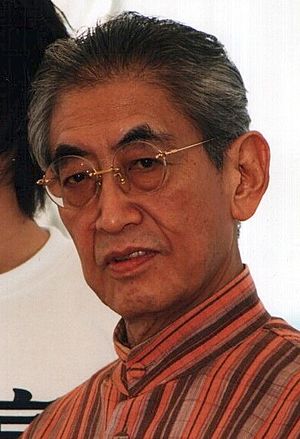Nagisa Ōshima facts for kids
Quick facts for kids
Nagisa Ōshima
|
|
|---|---|
| 大島 渚 (Ōshima Nagisa) | |

Ōshima in 2000
|
|
| Born | March 31, 1932 Tamano, Okayama, Empire of Japan
|
| Died | January 15, 2013 (aged 80) Fujisawa, Kanagawa, Japan
|
| Occupation | Film director Screenwriter |
| Years active | 1953–1999 |
| Movement | Nuberu Bagu |
| Spouse(s) |
Akiko Koyama
(m. 1960) |
| Children | 2 |
| Awards | Cannes Film Festival 1978 |
Nagisa Ōshima (大島 渚, Ōshima Nagisa, March 31, 1932 – January 15, 2013) was a famous Japanese film director and screenwriter. He was known for making movies that explored important social and political ideas. Ōshima was a key figure in the Japanese New Wave film movement. This movement saw filmmakers create new and exciting types of movies.
Contents
Early Life and Career Beginnings
Nagisa Ōshima was born on March 31, 1932. He grew up in Tamano, Japan. After finishing high school, he went to Kyoto University. There, he studied history and politics.
In 1954, Ōshima started working for a film company called Shochiku Ltd.. He quickly showed his talent for directing. His first full-length movie was A Town of Love and Hope in 1959.
Making Independent Films
Ōshima's career grew very fast. In 1960, he directed several important films. These included Cruel Story of Youth, The Sun's Burial, and Night and Fog in Japan.
Night and Fog in Japan explored his feelings about politics. He felt disappointed with how politics were going in Japan. Because of this, his film company, Shochiku, removed the movie from theaters very quickly. They were worried it might cause trouble.
After this, Ōshima left Shochiku. He decided to start his own independent film company. This meant he could make movies exactly how he wanted. Even with the controversy, Night and Fog in Japan was praised by Japanese film critics.
In 1961, Ōshima directed The Catch. This movie was based on a story by Kenzaburō Ōe. It looked at how people treated each other during wartime. It explored themes like unfairness and fear of people who are different.
Television Work and Later Films
Ōshima also spent time working in television. He made several documentaries. One important documentary was Diary Of Yunbogi from 1965. This film showed the lives of children living on the streets in Seoul, South Korea. Ōshima made it after visiting the country.
In 1971, he directed The Ceremony. This film made fun of some Japanese traditions. For example, one scene shows a wedding happening even without the bride!
A big success for Ōshima came in 1983 with Merry Christmas, Mr. Lawrence. This movie was partly in English. It was set in a Japanese prison camp during wartime. Famous stars like David Bowie and Ryuichi Sakamoto were in it. The film is now seen as a classic.
For many years, Ōshima was the president of the Directors Guild of Japan. This is an important group for film directors. He won an award from them in 1960.
Later Life and Legacy
In 1993, a collection of Ōshima's writings was published. It was called Cinema, Censorship and the State. In 1995, he made a documentary about 100 years of Japanese cinema.
In 1996, Ōshima had a stroke. But he worked hard to recover. In 1999, he returned to directing with the samurai film Taboo. This movie was set in old Japan and also starred Takeshi Kitano.
Ōshima was also good at English. In the 2000s, he worked as a translator. He translated several books into Japanese.
Nagisa Ōshima passed away on January 15, 2013, from pneumonia. He was 80 years old. The San Sebastian Film Festival held a special showing of his films in his honor that year.
Awards and Recognition
Blue Ribbon Awards
1961 Night and Fog in Japan & Cruel Story of Youth – Best New Director
2000 Taboo – Best Director & Best Film
Kinema Junpo Awards
1969 Death by Hanging – Best Screenplay
1972 The Ceremony – Best Director, Best Film & Best Screenplay
1984 Merry Christmas, Mr. Lawrence – Readers' Choice Award for Best Film
See also
 In Spanish: Nagisa Ōshima para niños
In Spanish: Nagisa Ōshima para niños
 | James B. Knighten |
 | Azellia White |
 | Willa Brown |

